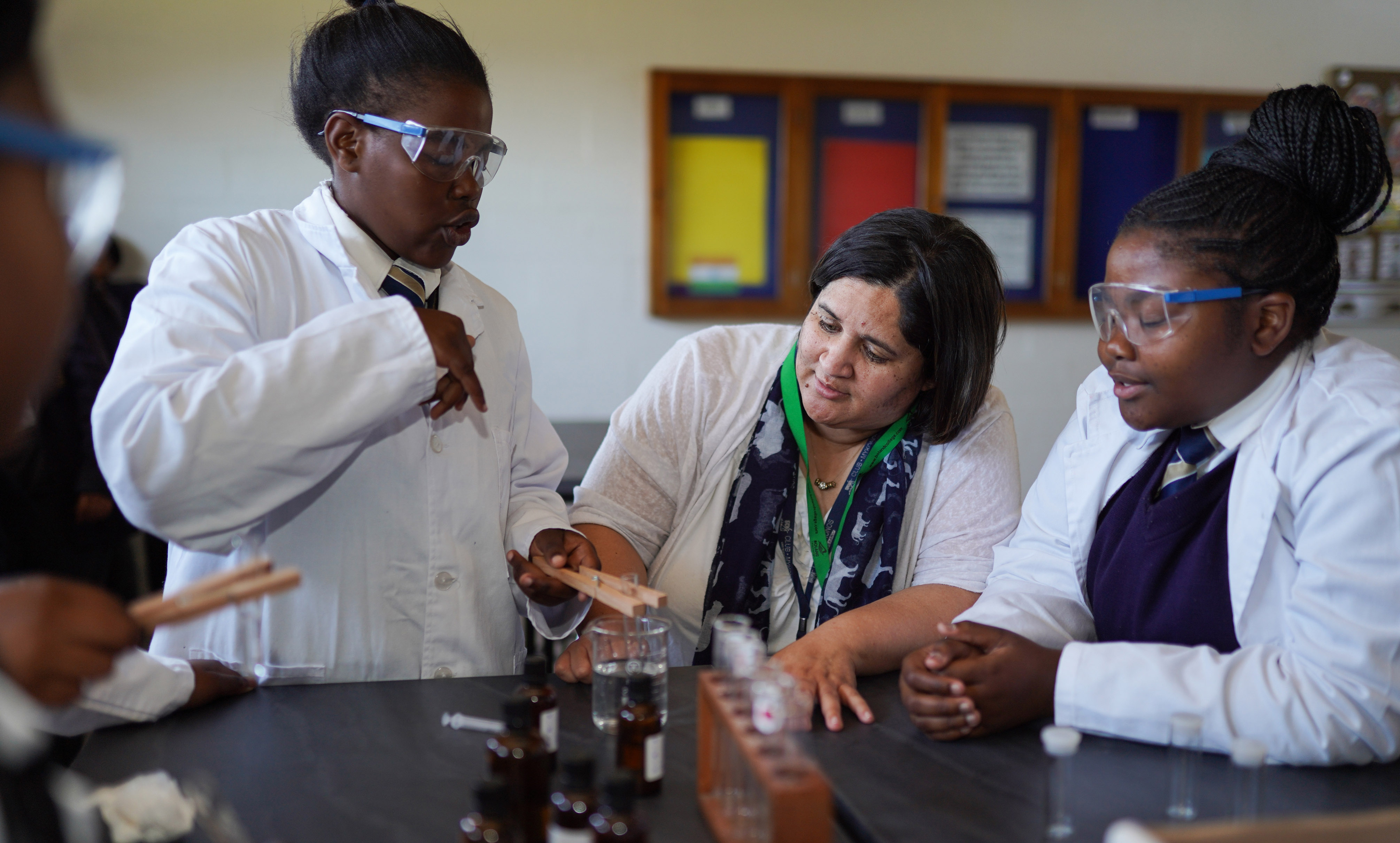Cape Town is often described as a tale of two cities – one of ocean-view villas and elite private schools, the other of overcrowded flats, informal settlements and generations trapped in poverty.
Tucked away in Ottery, there’s a school that doesn’t just teach, it transforms. Christel House South Africa is a unique institution: an independent, no-fee, nonprofit school serving some of the city’s most under-resourced communities. Here, education isn’t just about passing exams, it’s about disrupting poverty.
“We are almost a contradictory concept. We are an independent school catering for poor children, which means that they don’t pay school fees. Our children are all coming from very dire situations. They are mostly backyard dwellers, staying in very poor communities. Some of them come from informal settlements,” said Christel House’s chief academic officer, Ronald Fortune.
This contradiction is deliberate. Christel House’s mission is simple and powerful: to ensure poverty does not limit potential.
“We don’t want poverty to limit our children’s potential, and everything we do is geared towards that.
“We as educators and we at the school need to find solutions and work around the issues that our children come with to school,” Fortune said.
More than a classroom
 Christel House South Africa, located in Ottery, Cape Town, maintains a 98% daily attendance rate year-round. (Photo: Dylan Haskin)
Christel House South Africa, located in Ottery, Cape Town, maintains a 98% daily attendance rate year-round. (Photo: Dylan Haskin)
 Christel House’s chief academic officer, Ronald Fortune. (Photo: Supplied)
Christel House’s chief academic officer, Ronald Fortune. (Photo: Supplied)
To turn its mission into reality, the school wraps every child in a web of support that extends far beyond academics. Education doesn’t begin with a textbook, it begins with breakfast. Students receive daily transport to and from school, uniforms, two hot meals and a snack, on-site medical care, psychosocial counselling and long-term career and college planning. It’s the kind of holistic care most public schools simply can’t provide, but for Christel House, it’s non-negotiable.
“Many of our students only eat what we give them at school – breakfast, lunch and a snack. We can’t teach a hungry child,” Fortune said.
He added that hunger is just one of the many barriers the school’s students face. Children arrive carrying the weight of food insecurity, unstable housing and often trauma.
“You can’t teach a child who’s too sick to sit in class or too traumatised to concentrate, so we’ve built an entire system around our learners,” he said.
Fortune knows this journey because he’s lived it. He grew up in Bonteheuwel and later Mitchells Plain, two communities marked by poverty and violence.
“I know what it’s like to walk without shoes, never knowing if you’ll be safe. I know what it’s like when your parents can’t always provide,” he said.
Christel House operates a dedicated health and wellness department with two nurses, two social workers and full-time professional counsellors. These staff members work daily with students, navigating neglect, abuse, grief and other heavy realities that often come with growing up in poverty.
This deep investment in care pays off in ways that are both measurable and deeply human. The school maintains a 98% daily attendance rate year-round, which is nearly unheard of in the context in which Christel House operates.
Teaching with trauma in mind
 Christel House South Africa in Cape Town offers its learners holistic support, from free meals to psychosocial counselling and long-term career and college planning. (Photo: Dylan Haskin)
Christel House South Africa in Cape Town offers its learners holistic support, from free meals to psychosocial counselling and long-term career and college planning. (Photo: Dylan Haskin)
At Christel House, every teacher understands this truth: before a child can learn, they need to feel safe.
Most of the school’s students arrive carrying trauma, some visible, much of it buried beneath the surface. Many have experienced neglect, violence, abuse or loss. Some live in homes with incarcerated caregivers or face chronic food insecurity. Others have had to navigate gang territories just to get to school.
Fortune explained that poverty and trauma bring with them a host of developmental delays, and that if you don’t address those underlying issues, learning can’t happen.
That’s why the school has made trauma-informed teaching part of its DNA. All staff, particularly educators, are trained not just in pedagogy, but also in neuroscience: how trauma rewires the brain and how the right kinds of classroom interactions can help to repair those pathways.
Fortune explained how teachers at Christel House are taught to strategically activate the “feel-good” chemicals in the brain – serotonin, dopamine, endorphins and oxytocin – through everyday interactions.
Even Mondays require a different rhythm. “We know Mondays are hard. Our kids are coming back from chaotic weekends, often with no food, no sleep, no structure. You have to gently bring them back into a space where learning is possible,” said Fortune.
The school draws heavily from Eric Jensen’s book Teaching with Poverty in Mind, which Fortune called “a kind of bible” for the staff. The school doesn’t just train teachers once and leave them to figure it out. New educators go through a three-month acculturation process, guided by senior leaders, including Fortune, to help them unlearn assumptions and build a toolkit that’s specific to the needs of children so that they understand the weight the children carry and can still help them rise.
Beyond the finish line
 Christel House learners benefit from the school’s college and career programme, which extends support for five years into early adulthood. (Photo: Dylan Haskin)
Christel House learners benefit from the school’s college and career programme, which extends support for five years into early adulthood. (Photo: Dylan Haskin)
At Christel House, students benefit from the school’s college and career programme, which extends support for five years into early adulthood. This programme is designed to help students not only access higher education or employment, but also to stay and thrive there. It offers career guidance, vocational training, mentoring, help with tertiary applications and financial support through workshops and direct aid.
Even after finishing high school, alumni remain connected and supported with job placements, career workshops, financial assistance, on-site resources and continuous mentorship.
Fortune beamed with pride when he talked about the impact Christel House has had on its students’ lives.
“One graduate who stands out is now a doctor. He came to us from poverty, with so many obstacles stacked against him. Today, he’s a doctor. That’s the kind of future we’re building here,” he said.
The long-term success of the school’s alumni is matched by the unusual stability of its staff. In an education system where burnout is common and schools throughout the country face high teacher turnover, Christel House bucks the trend.
“We don’t lose teachers. They stay because they see the value in what they do,” Fortune said.
A school as a change agent
Fortune sees Christel House as a powerful agent of change, not just for its students, but also for their families, their communities and the country at large.
“This is about more than marks. It’s about character. It’s about values. It’s about showing children that where they come from does not define where they can go,” he said.
He recalled one student who had to dodge gangsters just to get home safely.
“He told me, ‘Sir, I have to run for my life every day’. But he kept showing up. He stayed the course. That’s what values can do.”
Another moment stays with him even more deeply. A young girl came to his office one Monday morning and quietly told him she’d been raped over the weekend.
“She trusted us enough to say something. She knew this was a safe space, that she would be believed and supported,” he said.
Asked what keeps him going, Fortune’s answer was straightforward: the students.
“I’ve always said the day my contribution becomes stale, I’d probably move on,” Fortune reflected. He believes that every community comes with its own challenges, and those challenges call for unique, deeply committed responses.
“It takes something special to get these children to school, to keep them here and to walk with them until they reach the goals they never thought possible,” he said.
Looking around at the students, the dedicated staff and the steady stream of graduates carving out new paths in the world, Fortune’s contributions continue to yield results. “This is what keeps me here, 21 years later. This is why I never left.” Christel House’s overhead and fundraising costs are funded annually through a charitable grant from Endless Success Foundation. DM
This story first appeared in our weekly Daily Maverick 168 newspaper, which is available countrywide for R35.





 Christel House learners benefit from the school’s college and career programme, which extends support for five years into early adulthood. (Photo: Dylan Haskin)
Christel House learners benefit from the school’s college and career programme, which extends support for five years into early adulthood. (Photo: Dylan Haskin)